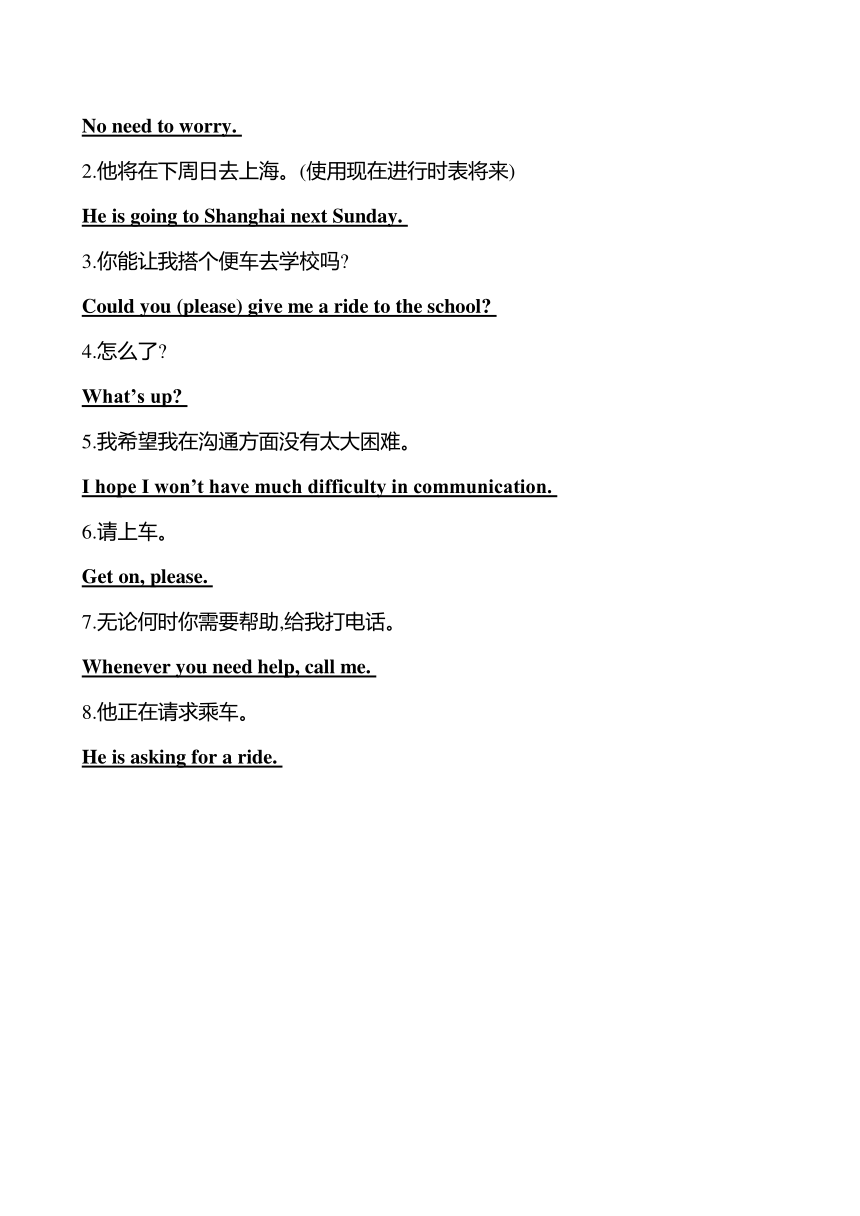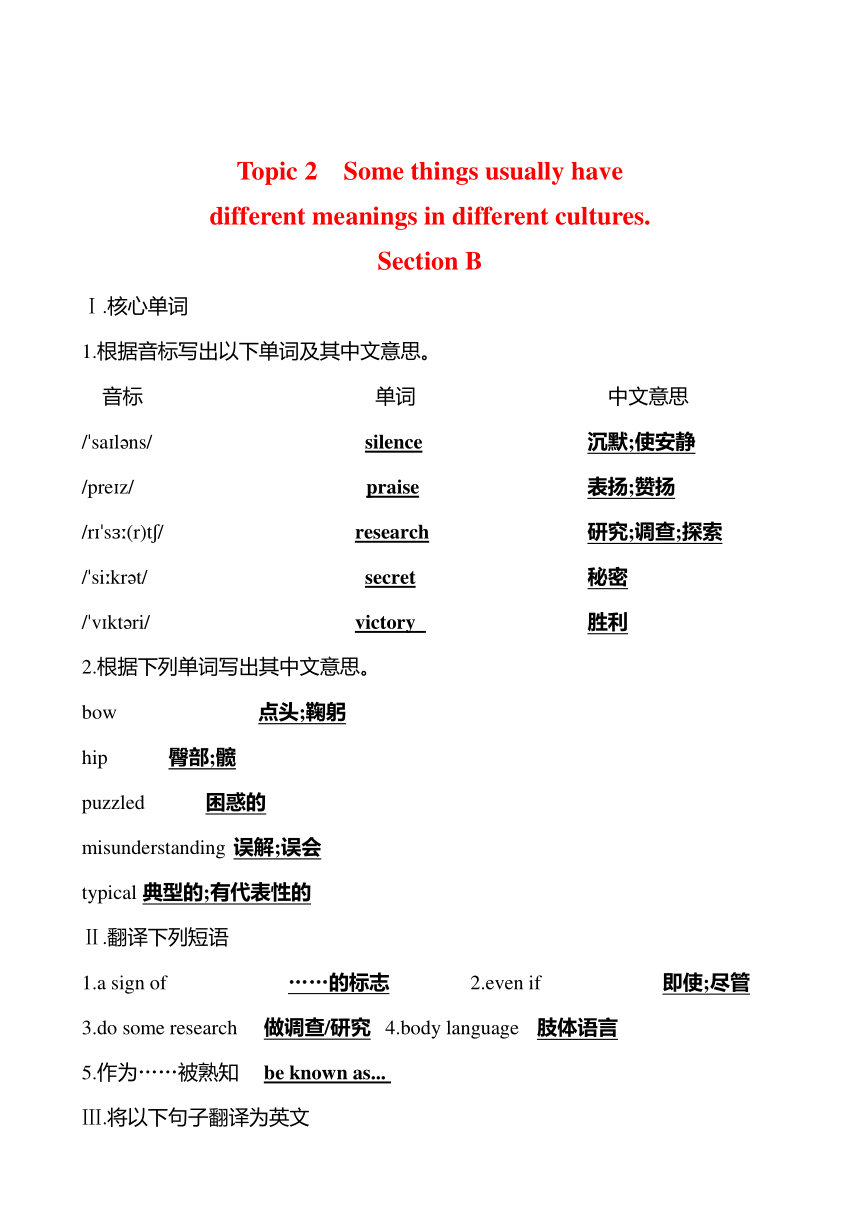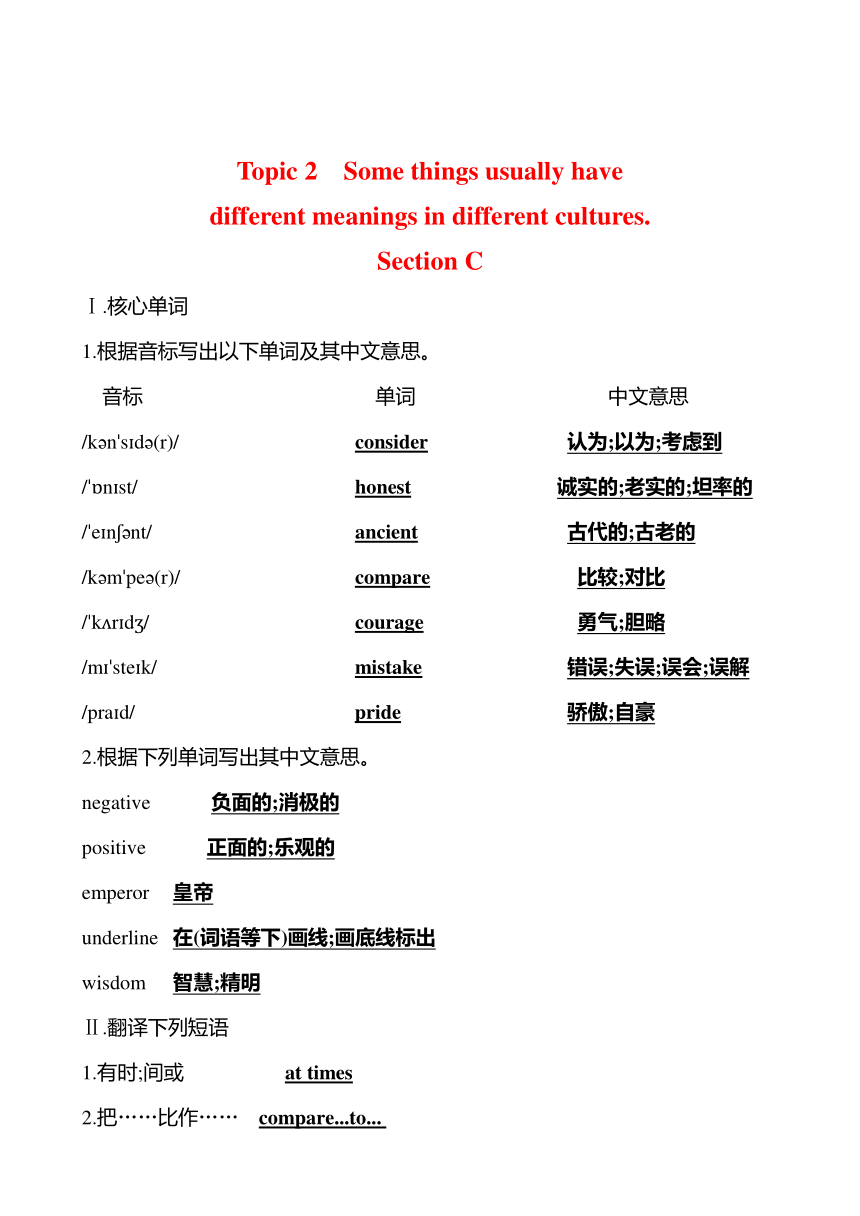Unit 3 Topic 2 Some things usually have different meanings in different cultures. 知识清单
文档属性
| 名称 | Unit 3 Topic 2 Some things usually have different meanings in different cultures. 知识清单 |

|
|
| 格式 | docx | ||
| 文件大小 | 25.6KB | ||
| 资源类型 | 教案 | ||
| 版本资源 | 仁爱科普版 | ||
| 科目 | 英语 | ||
| 更新时间 | 2024-10-22 00:00:00 | ||
图片预览





文档简介
Topic 2 Some things usually have
different meanings in different cultures.
Section A
Ⅰ.核心单词
1.根据音标写出以下单词及其中文意思。
音标 单词 中文意思
/ stre nd (r)/ stranger 陌生人
/wen ev (r)/ whenever 无论何时
/b (r)d/ board 上(船、火车、飞机等);住宿
2.根据下列单词写出其中文意思。
thumb 拇指
minibus 小型公共汽车
flight 航班飞机
guidebook 旅游指南
Ⅱ.翻译下列短语
1.请求乘车 ask for a ride
2.让某人搭便车 give sb. a ride
3.上车 get on 4.给某人送行 see sb. off
5.on one’s way to... 在某人去……的路上 6.put out 伸出
7.pick...up 接…… 8.have difficulty in doing sth. 在做某事上有困难
Ⅲ.将以下句子翻译为英文,注意括号内要求
1.没有必要担心。
No need to worry.
2.他将在下周日去上海。(使用现在进行时表将来)
He is going to Shanghai next Sunday.
3.你能让我搭个便车去学校吗
Could you (please) give me a ride to the school
4.怎么了
What’s up
5.我希望我在沟通方面没有太大困难。
I hope I won’t have much difficulty in communication.
6.请上车。
Get on, please.
7.无论何时你需要帮助,给我打电话。
Whenever you need help, call me.
8.他正在请求乘车。
He is asking for a ride.
Topic 2 Some things usually have
different meanings in different cultures.
Section B
Ⅰ.核心单词
1.根据音标写出以下单词及其中文意思。
音标 单词 中文意思
/ sa l ns/ silence 沉默;使安静
/pre z/ praise 表扬;赞扬
/r s (r)t / research 研究;调查;探索
/ si kr t/ secret 秘密
/ v kt ri/ victory 胜利
2.根据下列单词写出其中文意思。
bow 点头;鞠躬
hip 臀部;髋
puzzled 困惑的
misunderstanding 误解;误会
typical 典型的;有代表性的
Ⅱ.翻译下列短语
1.a sign of ……的标志 2.even if 即使;尽管
3.do some research 做调查/研究 4.body language 肢体语言
5.作为……被熟知 be known as...
Ⅲ.将以下句子翻译为英文
1.我们挥手表示和平和友谊。
We wave as a sign of peace and friendship.
2.我们使用肢体语言来交流我们的感受。
We use body language to communicate how we feel.
3.当她生气的时候,她就跺脚。
When she is angry, she stamps her foot.
4.祝你好运。
Good luck.
5.当他们开心的时候,他们微笑。
They smile when they are happy.
6.我猜想是否肢体语言在所有的国家代表同一个事情。
I wonder if body language means the same thing in all countries.
7.在日本,鞠躬代表尊敬。
Bowing is a sign of respect in Japan.
Topic 2 Some things usually have
different meanings in different cultures.
Section C
Ⅰ.核心单词
1.根据音标写出以下单词及其中文意思。
音标 单词 中文意思
/k n s d (r)/ consider 认为;以为;考虑到
/ n st/ honest 诚实的;老实的;坦率的
/ e n nt/ ancient 古代的;古老的
/k m pe (r)/ compare 比较;对比
/ k r d / courage 勇气;胆略
/m ste k/ mistake 错误;失误;误会;误解
/pra d/ pride 骄傲;自豪
2.根据下列单词写出其中文意思。
negative 负面的;消极的
positive 正面的;乐观的
emperor 皇帝
underline 在(词语等下)画线;画底线标出
wisdom 智慧;精明
Ⅱ.翻译下列短语
1.有时;间或 at times
2.把……比作…… compare...to...
3.把……和……作比较 compare...with...
4.被当作/认为…… be regarded/considered as...
5.为……感到自豪 take pride in... / be proud of...
6.stand for 代表
Ⅲ.将以下句子翻译为英文,注意括号内要求
1.众所周知,龙在中国文化中尤为重要。
As we know, dragons are very important in Chinese culture.
2.一些事物在不同的文化中通常有不同的含义。
Some things have different meanings in different cultures.
3.你是一个幸运儿。(谚语)
You are a lucky dog.
4.我们为我们的国家感到自豪。
We take pride in our country. / We are proud of our country.
5.当我们关注单词的多元化含义,我们将会更好地理解它们。
When we pay attention to the cultural meanings of words, we will understand them better.
Topic 2 Some things usually have
different meanings in different cultures.
Section D
Ⅰ.核心单词
1.根据音标写出以下单词及其中文意思。
音标 单词 中文意思
/ br t / British 英国的;英国人的
/pr n ns e n/ pronunciation 发音
/sent/ cent 分
2.根据下列单词写出其中文意思。
kowtow 叩头;磕头;唯命是从 expression 词语;表达;表情
spelling 拼写;拼法 totally 完全;全部地;整个地
elevator 电梯;升降机 cookbook 烹饪书
Ⅱ.翻译下列短语
1.从……借…… borrow...from...
2.in the past few centuries 在过去的几世纪
3.even worse 更糟糕的是 4.all the time 一直;总是
Ⅲ.用括号中所给词的正确形式填空
1.English is spoken(speak) by people in many places.
2.It’s possible(possible) for people from English-speaking countries to understand each other in English.
3.English is spoken differently(different) in different places.
Ⅳ.将以下句子翻译为英文,注意括号内要求
1.英语也通过从其他语言借用单词而改变了。(使用现在完成时态)
English has also changed by borrowing words from other languages.
2.单词的发音和讲的方式也发生了变化。(使用现在完成时态)
Pronunciation of words and ways of speaking have changed as well.
3.英语这门语言一直在改变。(使用现在进行时态)
The English language is changing all the time.
4.有时候,我没办法跟上他们。
Sometimes I can’t follow them.
5.我想要知道英式英语和美式英语的一些不同。
I want to know some differences between British English and American English.
Topic 2 Some things usually have
different meanings in different cultures.
话题小结
Ⅰ.词形转换
1.strange (adj.)陌生的 →stranger(n.)陌生人
2.silence (n.)沉默;无声 →silent(adj.) 沉默的;无声的
3.positive (adj.)正面的;乐观的 →negative(反义词) 负面的;消极的
4.total (adj.)全部的 →totally(adv.)全部地
Ⅱ.写出下列单词的过去式和过去分词
1.consider 过去式 considered 过去分词 considered
2.mistake 过去式 mistook 过去分词 mistaken
3.praise 过去式 praised 过去分词 praised
Ⅲ.根据句意,用括号内所给的提示完成句子
1.Michael is an honest (/ n st/) boy. He never lies to anyone.
2.Don’t make mistakes (犯错) next time!
3.He showed great courage(/ k r d /)by jumping into the cold lake to save the girl.
4.The little girl was so happy because she was praised (/pre zd/) by the teacher.
5.In Japan, people bow as a sign(标志) of respect.
Ⅳ.情景交际
1.好友Jack考试没考好,你想安慰他别担心,可以这样说:
No need to worry./ Don’t worry.
2.你想劝对方不要把自己和其他人作比较,可以这样说:
Don’t compare yourself with others.
3.你想表达你明天将要飞往北京,可以这么说:
I am flying to Beijing tomorrow./ I will fly to Beijing tomorrow.
4.你不清楚朋友的航班是什么时候,可以这样问对方:
What time / When is your flight
5.朋友提出了一个好主意,你可以这样称赞:
That / It is a good idea.
6.对于朋友的遭遇感到没办法相信,你可以这样说:
I can’t believe it.
7.你想表达再过几分钟你就要离开这儿了,可以这样说:
I am leaving here in several minutes./ I will leave here in several minutes.
8.你想对朋友说,你只是开个玩笑,可以这样说:
I am just kidding.
different meanings in different cultures.
Section A
Ⅰ.核心单词
1.根据音标写出以下单词及其中文意思。
音标 单词 中文意思
/ stre nd (r)/ stranger 陌生人
/wen ev (r)/ whenever 无论何时
/b (r)d/ board 上(船、火车、飞机等);住宿
2.根据下列单词写出其中文意思。
thumb 拇指
minibus 小型公共汽车
flight 航班飞机
guidebook 旅游指南
Ⅱ.翻译下列短语
1.请求乘车 ask for a ride
2.让某人搭便车 give sb. a ride
3.上车 get on 4.给某人送行 see sb. off
5.on one’s way to... 在某人去……的路上 6.put out 伸出
7.pick...up 接…… 8.have difficulty in doing sth. 在做某事上有困难
Ⅲ.将以下句子翻译为英文,注意括号内要求
1.没有必要担心。
No need to worry.
2.他将在下周日去上海。(使用现在进行时表将来)
He is going to Shanghai next Sunday.
3.你能让我搭个便车去学校吗
Could you (please) give me a ride to the school
4.怎么了
What’s up
5.我希望我在沟通方面没有太大困难。
I hope I won’t have much difficulty in communication.
6.请上车。
Get on, please.
7.无论何时你需要帮助,给我打电话。
Whenever you need help, call me.
8.他正在请求乘车。
He is asking for a ride.
Topic 2 Some things usually have
different meanings in different cultures.
Section B
Ⅰ.核心单词
1.根据音标写出以下单词及其中文意思。
音标 单词 中文意思
/ sa l ns/ silence 沉默;使安静
/pre z/ praise 表扬;赞扬
/r s (r)t / research 研究;调查;探索
/ si kr t/ secret 秘密
/ v kt ri/ victory 胜利
2.根据下列单词写出其中文意思。
bow 点头;鞠躬
hip 臀部;髋
puzzled 困惑的
misunderstanding 误解;误会
typical 典型的;有代表性的
Ⅱ.翻译下列短语
1.a sign of ……的标志 2.even if 即使;尽管
3.do some research 做调查/研究 4.body language 肢体语言
5.作为……被熟知 be known as...
Ⅲ.将以下句子翻译为英文
1.我们挥手表示和平和友谊。
We wave as a sign of peace and friendship.
2.我们使用肢体语言来交流我们的感受。
We use body language to communicate how we feel.
3.当她生气的时候,她就跺脚。
When she is angry, she stamps her foot.
4.祝你好运。
Good luck.
5.当他们开心的时候,他们微笑。
They smile when they are happy.
6.我猜想是否肢体语言在所有的国家代表同一个事情。
I wonder if body language means the same thing in all countries.
7.在日本,鞠躬代表尊敬。
Bowing is a sign of respect in Japan.
Topic 2 Some things usually have
different meanings in different cultures.
Section C
Ⅰ.核心单词
1.根据音标写出以下单词及其中文意思。
音标 单词 中文意思
/k n s d (r)/ consider 认为;以为;考虑到
/ n st/ honest 诚实的;老实的;坦率的
/ e n nt/ ancient 古代的;古老的
/k m pe (r)/ compare 比较;对比
/ k r d / courage 勇气;胆略
/m ste k/ mistake 错误;失误;误会;误解
/pra d/ pride 骄傲;自豪
2.根据下列单词写出其中文意思。
negative 负面的;消极的
positive 正面的;乐观的
emperor 皇帝
underline 在(词语等下)画线;画底线标出
wisdom 智慧;精明
Ⅱ.翻译下列短语
1.有时;间或 at times
2.把……比作…… compare...to...
3.把……和……作比较 compare...with...
4.被当作/认为…… be regarded/considered as...
5.为……感到自豪 take pride in... / be proud of...
6.stand for 代表
Ⅲ.将以下句子翻译为英文,注意括号内要求
1.众所周知,龙在中国文化中尤为重要。
As we know, dragons are very important in Chinese culture.
2.一些事物在不同的文化中通常有不同的含义。
Some things have different meanings in different cultures.
3.你是一个幸运儿。(谚语)
You are a lucky dog.
4.我们为我们的国家感到自豪。
We take pride in our country. / We are proud of our country.
5.当我们关注单词的多元化含义,我们将会更好地理解它们。
When we pay attention to the cultural meanings of words, we will understand them better.
Topic 2 Some things usually have
different meanings in different cultures.
Section D
Ⅰ.核心单词
1.根据音标写出以下单词及其中文意思。
音标 单词 中文意思
/ br t / British 英国的;英国人的
/pr n ns e n/ pronunciation 发音
/sent/ cent 分
2.根据下列单词写出其中文意思。
kowtow 叩头;磕头;唯命是从 expression 词语;表达;表情
spelling 拼写;拼法 totally 完全;全部地;整个地
elevator 电梯;升降机 cookbook 烹饪书
Ⅱ.翻译下列短语
1.从……借…… borrow...from...
2.in the past few centuries 在过去的几世纪
3.even worse 更糟糕的是 4.all the time 一直;总是
Ⅲ.用括号中所给词的正确形式填空
1.English is spoken(speak) by people in many places.
2.It’s possible(possible) for people from English-speaking countries to understand each other in English.
3.English is spoken differently(different) in different places.
Ⅳ.将以下句子翻译为英文,注意括号内要求
1.英语也通过从其他语言借用单词而改变了。(使用现在完成时态)
English has also changed by borrowing words from other languages.
2.单词的发音和讲的方式也发生了变化。(使用现在完成时态)
Pronunciation of words and ways of speaking have changed as well.
3.英语这门语言一直在改变。(使用现在进行时态)
The English language is changing all the time.
4.有时候,我没办法跟上他们。
Sometimes I can’t follow them.
5.我想要知道英式英语和美式英语的一些不同。
I want to know some differences between British English and American English.
Topic 2 Some things usually have
different meanings in different cultures.
话题小结
Ⅰ.词形转换
1.strange (adj.)陌生的 →stranger(n.)陌生人
2.silence (n.)沉默;无声 →silent(adj.) 沉默的;无声的
3.positive (adj.)正面的;乐观的 →negative(反义词) 负面的;消极的
4.total (adj.)全部的 →totally(adv.)全部地
Ⅱ.写出下列单词的过去式和过去分词
1.consider 过去式 considered 过去分词 considered
2.mistake 过去式 mistook 过去分词 mistaken
3.praise 过去式 praised 过去分词 praised
Ⅲ.根据句意,用括号内所给的提示完成句子
1.Michael is an honest (/ n st/) boy. He never lies to anyone.
2.Don’t make mistakes (犯错) next time!
3.He showed great courage(/ k r d /)by jumping into the cold lake to save the girl.
4.The little girl was so happy because she was praised (/pre zd/) by the teacher.
5.In Japan, people bow as a sign(标志) of respect.
Ⅳ.情景交际
1.好友Jack考试没考好,你想安慰他别担心,可以这样说:
No need to worry./ Don’t worry.
2.你想劝对方不要把自己和其他人作比较,可以这样说:
Don’t compare yourself with others.
3.你想表达你明天将要飞往北京,可以这么说:
I am flying to Beijing tomorrow./ I will fly to Beijing tomorrow.
4.你不清楚朋友的航班是什么时候,可以这样问对方:
What time / When is your flight
5.朋友提出了一个好主意,你可以这样称赞:
That / It is a good idea.
6.对于朋友的遭遇感到没办法相信,你可以这样说:
I can’t believe it.
7.你想表达再过几分钟你就要离开这儿了,可以这样说:
I am leaving here in several minutes./ I will leave here in several minutes.
8.你想对朋友说,你只是开个玩笑,可以这样说:
I am just kidding.
同课章节目录
- Unit 1 The Changing World
- Topic 1 Our country has developed rapidly.
- Topic 2 The population in developing countries is
- Topic 3 The world has changed for the better.
- Unit 2 Saving the earth.
- Topic 1 Pollution has causes too many problems.
- Topic 2 All these problems are very serious.
- Topic 3 What can we do to protect the environment
- Unit 3 English around the World
- Topic 1 English is widely spoken around the world.
- Topic 2 Some things usually have different meaning
- Topic 3 Could you give us some advice on how to l
- Unit 4 Amazing Science
- Topic 1 When was it invented?
- Topic 2 I'm excited about the things that will be
- Topic 3 China is the third nation that sent a pers
